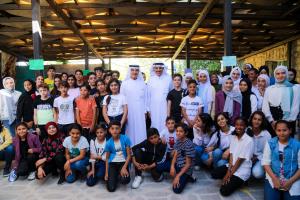Education and Skills Training Open Doors for Refugee Youth in Jordan and Lebanon
Education and skills training empower 100,000+ refugee youth in Jordan and Lebanon, creating jobs, boosting livelihoods, and driving long-term impact.
Published under the Abdul Aziz Al Ghurair Refugee Education Fund, the report captures how over 100,000 youth—53% of them female—have been reached across Jordan and Lebanon since 2018. Backed by AED 165 million in philanthropic support, the Fund’s model has enabled the creation of 585 new businesses and supported 380 small and medium-sized enterprises, offering scalable solutions in contexts marked by instability and economic hardship.
“It is with education that young people can develop their mind, their character, and a hopeful perspective to become productive and self-reliant members of their communities,” said His Excellency Abdul Aziz Al Ghurair, Chairman of the Abdulla Al Ghurair Foundation. “And we, as philanthropists and educators, must empower them to find their own pathways to elevated livelihoods.”
The report presents six case studies of locally grounded, context-responsive programs that integrate technical and soft skills, English training, career coaching and employer engagement. Delivered through grassroots and regional partners, these initiatives respond to a growing demand for education-to-livelihood pathways rooted in dignity, relevance and long-term impact.
Dr. Sonia Ben Jaafar, CEO of the Abdulla Al Ghurair Foundation, emphasized the importance of strategic vision behind the work. “Strategic philanthropy is at its best when it empowers local actors and enables systemic change,” she said. “We are equipping young people with skills while helping them build confidence, agency and networks that support them to thrive. This is not temporary relief. It is a sustained investment in long-term opportunity for youth in fragile contexts.”
Surveyed participants across both countries reported high satisfaction, improved job performance and strengthened career networks. In Jordan, 94% said their work improved post-training, while 65% secured employment. In Lebanon, programs focused on digital literacy, entrepreneurship, freelance and remote work pathways as viable entry points into the workforce.
The report also emphasizes the role of Zakat-based giving as a means of long-term youth empowerment, inviting a renewed understanding of how Islamic philanthropy can advance education and economic inclusion.
Learners themselves reflected the report’s impact in their own words. “I am now studying IT at the university because of the digital skills course I took and the laptop I received through the program, which enabled me to explore and discover the field,” said a participant in Jordan. In Beirut, another young woman shared, “I thought I was a loser. I didn’t know how to write or read so I didn’t have motivation. But they encouraged me so now I desire to learn, and my morale is up.”
As global aid budgets shrink and conflict deepens across the region, the Foundation is calling on governments, donors and civil society to co-create inclusive, resilient solutions that align education with market needs and deliver real opportunity for the next generation.
Notes to Editors:
About the Abdulla Al Ghurair Foundation (AGF):
The Abdulla Al Ghurair Foundation (AGF), established in 2015, is the largest privately funded philanthropic organization focused on education in the Arab region. It supports Emirati and Arab youth through high-impact programs and strategic partnerships that build future-ready skills. To date, AGF and the Abdul Aziz Al Ghurair Refugee Education Fund—administered by AGF—have reached over 354,000 young people.
About the Abdul Aziz Al Ghurair Refugee Education Fund
Established in 2018, the Abdul Aziz Al Ghurair Refugee Education Fund supports refugee and vulnerable youth in Jordan and Lebanon with access to secondary, vocational, and tertiary education through high-impact, scalable programs that link learning to livelihoods.
AGF PR Team
Abdulla Al Ghurair Foundation/AGF
+971 55 885 1308
email us here
Legal Disclaimer:
EIN Presswire provides this news content "as is" without warranty of any kind. We do not accept any responsibility or liability for the accuracy, content, images, videos, licenses, completeness, legality, or reliability of the information contained in this article. If you have any complaints or copyright issues related to this article, kindly contact the author above.
Historic Monument in Marietta Faces Removal Amid Preservation Concerns
Qatar Integrates Youth into Global Diplomacy Through New Role at United Nations
Maxeemize Offers Complimentary Digital Marketing Audit as Part of Exclusive July Summer Promotion for Small Businesses
Kalendarium
Więcej ważnych informacji
 Jedynka Newserii
Jedynka Newserii

 Jedynka Newserii
Jedynka Newserii

Ochrona środowiska

Polskie przedsiębiorstwa otwarte na transformację w kierunku gospodarki obiegu zamkniętego. Nowa mapa drogowa mogłaby w tym pomóc
Do 2030 roku z gospodarki o obiegu zamkniętym ma pochodzić co czwarty surowiec. Aby przyspieszyć ten proces, w Polsce potrzeba nowej, międzysektorowej Mapy Drogowej dla Gospodarki o Obiegu Zamkniętym – wskazywali eksperci w trakcie Polish Circular Forum. Obecny dokument nie spełnia już swojej roli i wymaga aktualizacji. Na braku jasnych przepisów i systemu wsparcia najbardziej cierpią przede wszystkim małe i średnie przedsiębiorstwa. – Z naszych badań wynika, że tylko 3–3,5 proc. firm z sektora MŚP jest świadomych i przygotowanych do transformacji – ocenia Agnieszka Zdanowicz, wiceprezes Klastra Gospodarki Cyrkularnej i Recyklingu.
Prawo
Wspólna polityka rolna do deregulacji. Trwają prace nad uproszczeniami dla rolników

Prawie 1,6 mld euro – tyle mają wynieść roczne oszczędności dla rolników po uproszczeniu wspólnej polityki rolnej. Zaproponowany w maju przez Komisję Europejską pakiet zmian zakłada redukcję części obowiązków administracyjnych, które dziś spoczywają na rolnikach ubiegających się o unijne wsparcie. Szczególnie dotyczy to płatności dla drobnych rolników. Jak podkreślają eksperci, wszelkie zmiany, które będą działać na rzecz konkurencyjności unijnego rolnictwa, są wskazane, ale przy uwzględnieniu wysokiego poziomu bezpieczeństwa żywności.
Polityka
W rosyjskiej niewoli może przebywać kilkadziesiąt tysięcy Ukraińców. Napięta sytuacja geopolityczna sprzyja Rosji

W rosyjskiej niewoli przebywa około 10 tys. obywateli Ukrainy, z czego ponad 8 tys. to żołnierze. Łącznie jednak może ich być nawet kilkukrotnie więcej. ONZ podaje, że ponad 95 proc. ukraińskich jeńców wojennych jest poddawanych torturom. – Pogarszająca się sytuacja międzynarodowego bezpieczeństwa i wzrost wpływów do budżetu Federacji Rosyjskiej ze względu na wzrost cen ropy mogą się negatywnie odbić na planowanych wymianach jeńców – ocenia Michał Dworczyk, wiceprzewodniczący Komisji Bezpieczeństwa i Obrony w Parlamencie Europejskim.
Partner serwisu
Szkolenia

Akademia Newserii
Akademia Newserii to projekt, w ramach którego najlepsi polscy dziennikarze biznesowi, giełdowi oraz lifestylowi, a także szkoleniowcy z wieloletnim doświadczeniem dzielą się swoją wiedzą nt. pracy z mediami.









.gif)

 |
| |
| |
|